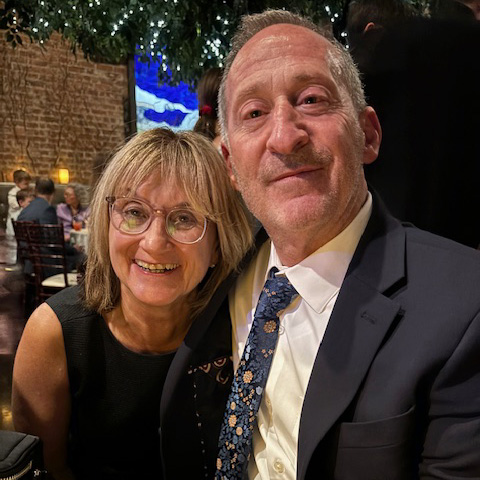Against All Odds, Dave Glick Triumphed Over Colon, Pancreas & Prostate Cancer
Contributing Writer
Julia Brabant
November 8, 2024
Diagnosed: 2011, 2020, 2023
Current Status: Currently cancer free
What are the odds of getting three types of cancer when a spouse has already survived one? Probably pretty low, but for Milwaukee, Wisconsin’s Dave Glick, that scenario became a reality. Dave’s wife, Kathi, is a 24-year ovarian cancer survivor, while Dave has had three different types of the disease: colon, pancreas and prostate cancers. Despite the overwhelming odds against them, they’ve maintained their shared sense of humor, noting that “We can’t win the lottery, but we sure can get cancer.”
Dave’s first bout with cancer began in 2011, when a colon cancer diagnosis caught him completely off guard. A colonoscopy led to an emergency surgery to treat the condition, and Dave had 16 rounds of chemotherapy afterward to kill any remaining cancer and help prevent its return.
It was during one of Dave’s follow-up visits for colon cancer when routine scans identified a spot of concern on Dave’s pancreas. More tests and a biopsy followed, and Dave’s medical team determined he had Stage 1 pancreatic cancer. Dave’s doctors warned him about the aggressiveness of his particular cancer and Dave and his wife took those words to heart, meeting with Dr. Douglas B. Evans, an oncologist and surgeon specializing in pancreatic cancer at Froedtert & The Medical College of Wisconsin, within a week of his diagnosis.
“We’re going to keep you alive,” Dave and Kathi recall the doctor saying, giving the pair a glimmer of hope amidst mounting uncertainty.
“When a doctor says something like that to you, there’s a bond there,” Dave said. “It rewired my whole way of thinking.”
Dr. Evans recommended Dave have chemotherapy to help shrink the spot, and Dave heeded that advice, taking a series of five different chemotherapy drugs. He also endured a 50-hour intravenous chemotherapy drip, which, despite the difficult side effects of the initial drugs, proved to be the most challenging part of his treatment.
Dave also had to transition from having his wife accompany him to the chemo treatments to attending them alone due to the onset of the COVID-19 pandemic. The side effects of the chemo were brutal—mouth sores, a loss of appetite and extreme sensitivity to cold became a daily struggle. Even acts as simple as drinking cold water or opening the refrigerator became unbearable, forcing him to develop to new routines to minimize his discomfort. It wasn’t all bad news, though – during Dave’s first cancer battle, his doctors warned him he’d lose his hair, but that never came to fruition. The same held true during his second course of treatment despite doctors virtually guaranteeing he’d experience hair loss.
During this phase of treatment, Dave also decided to participate in a clinical trial involving targeted radiation therapy. Instead of having 35 five-minute radiation treatments, the trial took a more concentrated approach, with Dave having just five radiation treatments, each lasting an hour. This innovative method reduced the amount of time Dave had to spend getting radiation, allowing him to reclaim precious time he’d otherwise spend in treatment.
“It was a no-brainer for me,” Dave said, of his decision to sign on to the clinical trial. “It was an easy to decision to make.”
The surgery, chemotherapy and radiation clinical trial appeared to work as intended, and Dave was able to continue his work as a psychotherapist afterward. About three years passed before another medical issue involving Dave’s eyes caused him to undergo surgery yet again. While treating his eye condition, Dave realized that he hadn’t tested his prostate-specific antigen, or PSA, levels, in two years, so he requested he have such a test.
The test revealed elevated PSA levels, prompting Dave’s doctors to conduct additional tests.
More testing and a biopsy revealed that Dave had a third form of cancer. Doctors told Dave he had Stage 3 “TA” prostate cancer, meaning they thought the cancer had spread beyond his prostate (although they later determined it had not).
With no other available options for treatment, Dave opted to have his prostate removed. While this required some lifestyle adjustments, Dave tried to live a life similar to the one he had before his three diagnoses, continuing to work, exercise and prioritize his strength and fitness. He knew that the stronger and healthier he was, the higher his chances were of recovery and longevity.
“I think, with three cancers, I’m a lot more tired than I was before,” he said. “But I won’t stop working out; I know that would hurt me.”
Dave also continues to monitor his health closely, having scans twice a year to keep a close eye on any changes. He also met with a psychotherapist and underwent Eye Movement Desensitization and Reprocessing, or EMDR, therapy, which can help people move past trauma and difficult memories, which he says was incredibly helpful.
Dave also took a proactive approach to having genetic testing to determine if he had any hereditary predispositions to cancer that his blood relatives should know about. The tests didn’t show any clear predispositions to cancer, but Dave wanted to ensure his family could take necessary precautions or screenings if necessary.
While he continues his recovery and his efforts to maintain a relatively normal life, Dave has also had some time to reflect on the people who’ve helped him navigate his three bouts of cancer. He commended Dr. Ben George, who helped treat his colon cancer following the death of his initial oncologist. He also applauded Dr. Evans and the entire team at MCW, including Nurse Practitioners Natalie Lang and Gabby Pyptiuk. Dave also made a point to credit his urologist, Dr. Christopher Walsh, who has been by his side since his initial colon cancer diagnosis. Dr. Walsh not only stayed on top of every detail, ensuring Dave received the best available care, but he also brought a sense of humor to each encounter, lightening the mood through even the most challenging moments.
Dave also gave props to his wife, Kathi, for putting up with him during his darkest, most difficult days and helping him recognize when his health battles started to impact his attitude and affect those around him. He also credited his other family members, including all three of his children, for their ongoing support and encouragement. Dave’s 24-year-old grandson, Alex, also lived with the couple during the COVID-19 pandemic and played a huge role in helping the family, whether that meant researching Dave‘s condition and treatment options or helping out around the house.
Dave’s daughter and her boyfriend also helped raise Dave’s spirits, giving the self-proclaimed “Dead Head” a Jerry Garcia doll he ended up toting to treatment and appointments to remind him to stay positive and maintain a sense of humor along the way.
Dave also expressed gratitude for his employer, ProHealth Care, and reserved special appreciation for his colleague of several decades, Mary Smith, who worked with Dave every step of the way to make sure he had the support he needed, both inside and out of the workplace. Because of the kindness, flexibility and understanding of his employer and colleagues, Dave was able to modify his schedule and adjust his tasks as needed, ensuring he could focus on recovery without the added stress of work demands.
While Dave has a renewed sense of gratitude for those who’ve helped during his three battles, he also recognizes that he wishes he’d done more as a source of support for his own wife when she was fighting cancer.
“I hate to say this, but I wasn’t there for her like I should have been,” he said. “Looking back now, I’d do that completely differently.”
As a survivor of three types of cancer, Dave also has some words of advice for others facing similarly challenging circumstances.
“Don’t think of it as an automatic death sentence,” Dave said. “Whatever you do, be hopeful. Stay involved with your treatment, but the most important thing is hope.”
Both Dave and Kathi also recommend pursuing dreams and passions without delay in the wake of a cancer diagnosis. They chose to practice what they preach, fulfilling one of Dave’s lifelong dreams to own a pontoon boat. Now, they spend as much time out on the boat as Wisconsin’s climate allows.
“We’re getting older, we need to have some fun,” Kathi said. “When you’re out there looking up at the sky, the sunsets…it teaches us to embrace what we have now.”
Whether relaxing on their new pontoon boat or enjoying time with family, Dave and Kathi recognize that while they may not be “lucky” in the traditional sense, they’re fortunate to still be here – and to have had the support and assistance of so many great people along the way.
“We may not have won the monetary lottery,” Kathi said. “But we won the lottery of life.”



